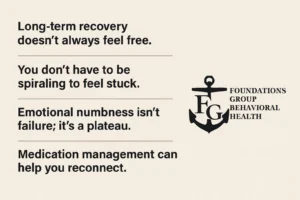You’ve made it further than most.
You went to treatment. You stayed sober. You did the hard things—maybe multiple times. You rebuilt your life, or at least parts of it. And for a while, that was enough.
But lately?
Everything feels… stuck.
You’re not spiraling. You’re not using. You’re not in danger. But you’re also not okay. Not really.
It’s like being parked in neutral. You’re technically still moving—but it’s all friction. No momentum. No joy.
If you’ve felt that flatness—the emotional stalling that long-term recovery sometimes brings—this blog is for you. Not because you’re failing. But because you’re ready for more than just not falling apart.
At Foundations Group Behavioral Health, we support people who are stable, sober—and stuck. Our medication management program in Cape Cod is designed for alumni who want to break out of maintenance mode and reconnect with themselves, their emotions, and their lives.
Long-Term Recovery Doesn’t Always Feel Free
At first, recovery is loud. Everything is new. There are milestones, firsts, intense emotions. You’re rebuilding from rock bottom, and the work is urgent.
But then… it levels out. And no one warns you what that quiet can feel like.
You start asking questions you didn’t have time to ask before:
- Why don’t I feel better?
- Is this all recovery is?
- What happened to joy? To laughter? To wanting more?
You’re functioning. You’re grateful. And yet, you feel emotionally flat. Maybe tired all the time. Maybe disconnected from things you used to love. Maybe secretly wondering if this is just what “okay” looks like now.
It’s not.
You didn’t come this far just to feel numb in a different way.
When You’re Not in Crisis, But You’re Not Connected Either
A lot of alumni assume they should feel more by now. That the absence of crisis means the presence of peace.
But that’s not always how it works.
Sometimes, emotional numbness creeps in slowly. You stop laughing. You stop crying. You go through the motions—meetings, work, parenting—but nothing lights up inside. You’re doing everything “right,” but it still feels like something’s missing.
This isn’t relapse. It’s a recovery plateau. And it’s more common than most people think.
The truth is: many long-term alumni hit this wall. And it has nothing to do with how hard you worked, how long you’ve been clean, or how grateful you are.
It has everything to do with what’s still unresolved in your body and brain.
Medication Management Isn’t Just for the Beginning
It’s easy to think medication is only for the crisis chapters—the beginning of treatment, acute depression, panic, or relapse.
But for many alumni, that middle-zone flatness is rooted in neurochemistry. You’re doing the work, but your brain is still dragging. The spark just isn’t coming back.
And that’s where medication management comes in.
We work with clients who aren’t in crisis—but who are deeply tired of the emotional gray zone. They’re showing up for life, but it all feels muted. And no matter how many routines or practices they put in place, it’s not cutting through.
Medication—when managed well and tailored carefully—can support mood regulation, energy, focus, and emotional engagement. It doesn’t erase your recovery work. It helps you feel the benefits of it.
What “Better” Actually Looks Like in Year 2 (or 10)
You’ve heard it before: “Recovery is a gift.”
And it is. But gifts aren’t always satisfying when they’re wrapped in numbness.
You didn’t get sober to feel nothing. You didn’t rebuild your life to feel emotionally disconnected from it.
Our medication management program is about helping you redefine what better looks like at this stage of your journey. That might include:
- Feeling real joy—not just performing it
- Having energy after 2pm
- Enjoying music, food, or connection again
- Finally sleeping through the night
- Crying and feeling—not fearing—your emotions
We serve alumni across the Cape, including Barnstable County and Falmouth, who are asking for more than stability. They want meaning, connection, color again.
Medication Doesn’t Replace the Work—It Deepens It
We know the fear: “If I go on meds, does that mean I’m failing?”
No. It means you’re honest enough to recognize that even strong systems sometimes need support.
Our medication management program doesn’t replace the emotional, behavioral, or spiritual parts of your recovery. It enhances them. When your brain has the support it needs, therapy hits deeper. Connection feels more real. The fog lifts just enough to see what else is possible.
Here’s what our program includes:
- Collaborative psychiatric evaluation (you’re part of the conversation—not a bystander)
- Gentle, gradual trial periods (we don’t rush, we don’t pressure)
- Ongoing check-ins to adjust and assess
- Integration with therapy or community supports you already have
It’s not about numbing out. It’s about clearing the static so you can hear yourself again.
It’s Okay to Want More Than Just Not Relapsing
Somewhere along the way, you may have internalized this:
“As long as I’m not using, I should be fine.”
“Other people would kill for this kind of stability.”
“I should be grateful.”
“Wanting more feels selfish or risky.”
But craving more isn’t greedy. It’s healthy.
You’re not betraying your recovery by wanting to feel alive again. You’re honoring it.
You’ve already fought so hard to stay. Now you get to choose how fully you want to live.
FAQ: Medication Management for Alumni in Recovery
What if I’m afraid medication will change my personality?
This is a common fear. Our approach is careful, collaborative, and slow. We work with you to ensure any changes support your goals and values—not override them.
Is it safe to take medication in long-term recovery?
Yes, especially when managed by experienced professionals. We avoid medications with high abuse potential and prioritize options that align with your recovery plan.
Do I have to stop going to therapy or meetings if I start meds?
Not at all. In fact, most of our clients continue therapy and peer support. Medication isn’t an “either/or”—it’s a “both/and” when used mindfully.
What if I tried meds before and it didn’t help?
That’s okay. Your needs may have changed since then. We’ll re-evaluate with fresh eyes and work with you to explore other options or combinations.
Can I just talk to someone without starting medication?
Yes. An evaluation doesn’t commit you to anything. Sometimes, just having the conversation is enough to get clarity and consider next steps.
You’re Not Broken. You’re Ready.
There’s no award for gritting your way through emotional flatness.
You’ve survived long enough. You’ve carried this long enough.
You didn’t come this far to feel numb in a prettier package.
If you’re stuck in neutral, it doesn’t mean you’ve failed. It means your system is ready for the next level—and you don’t have to figure that out alone.
Let us walk with you into what comes after survival.
Let’s rediscover what it means to feel alive.
Call 888-685-9730 or visit our homepage to learn more about our medication management services for alumni across Cape Cod, MA—including Barnstable County and Falmouth.
You’ve done the hard part. Now let’s help you feel the fullness of what you fought for.









